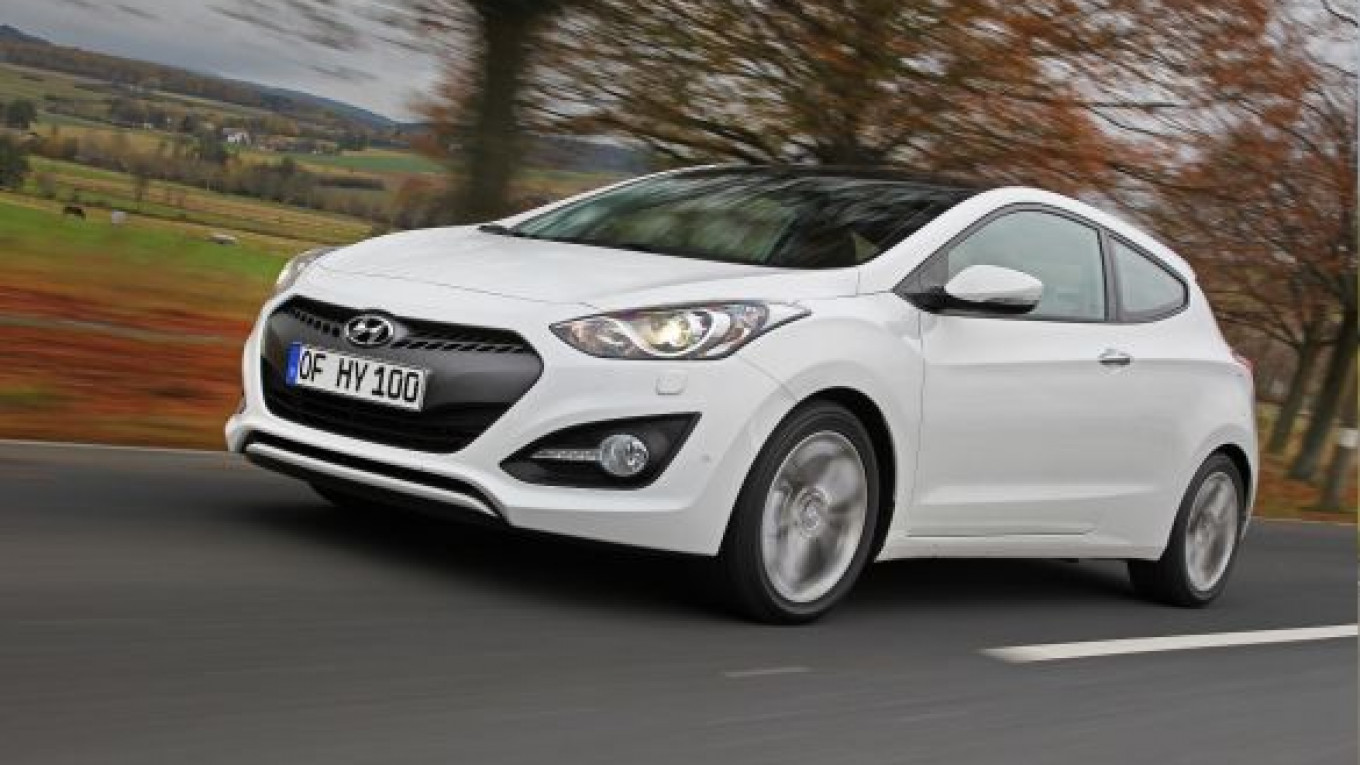Editor's note: Wheels is a section featuring car reviews.
Diesel engines are still too noisy, in my opinion.
I've driven Jaguars, Audis and BMWs and found that it is still easy to distinguish a diesel from a gas car by the telltale rattle.
The appeal of diesels has also been tarnished by the fact that gas engines are now becoming increasingly efficient; it is not uncommon for one to return over 20 kilometers per liter these days.
Facts at a Glance
Hyundai i30
Price range: 649,000 rubles to 949,000 rubles ($19,676 to $28,793)
Technical Specifications
0- 100 kph: 11.5 seconds
Power: 109 bhp
Top speed: 185 km/h
Economy: 31.5 kpl (extra urban)
Source: Hyundai
But if a diesel car is packaged correctly, it can still be an attractive proposition.
This brings me to the second generation Hyundai i30, which has frankly surprised me. The designers have gone to town and produced something that is noticeably different from the usual Fords, Vauxhalls, Renaults and Peugeots; I do like that grille and the sweeping curves. The most striking thing about this car though is its sheer quietness.
It's that quietness that led me to believe I was driving a gas car for the first day of the test. It was only when I read the specification that I realized I wasn't. Stand outside with the engine running, and it is barely audible, as you can hear in the video at The Moscow Times website. Sit inside with it idling, and again you can hardly hear it. This is a phenomenal achievement, especially in a car that is priced at well under 1 million rubles ($30,341). This really does put far more expensive competitors to shame.
It is also fitted with engine stop/start which is very reliable and cuts in at all the right points and helps return over 30 kpl. Usually, that diesel rattle kicks in on start up, but again a very smooth operation. This feature is also important in terms of tackling pollution, and nowhere will this be more apparent than in heavily congested cities such as Moscow with endless traffic jams and the ensuing pollution trail. Yes, the Hyundai will certainly be a welcome vehicle in such situations.
My surprise continues because inside this 1.6-liter model there is a good amount of room, too. Bear in mind that this is a very similar-sized car to the upmarket Audi A3, which I recently tested, and yet it is far more spacious. In the Audi, it really was a struggle to get two cumbersome baby seats in the rear, mainly because the front seats did not fold far enough forward. In the Hyundai, this wasn't an issue. There was also more legroom front and back.
With steering mounted controls for the cruise control, radio and telephone, the important things are close to hand. My one qualm is that because the volume controls and such are on the steering wheel, they do not stay in the desired position when going around a bend or a roundabout. Therefore, if the volume needs to be turned down for any reason, the driver ends up resorting to the volume knob on the stereo.
Air conditioning was much appreciated when the sun finally decided to come out and temperatures soared to over 22 degrees Celsius.
Car interiors have come on in leaps and bounds. My wife was once the proud owner of a 1989 Hyundai Pony. Its dated appearance belied the fact that it was a robust little car and Caroline clocked up a good 32,000 kilometers in her beloved High n' Dry before selling it on. The interior was basic and black with no cloth but vinyl, plastic and rubber. Black is still the preference, but the i30 has some character: For instance the speedometer and rev counter remind me of cats eyes in their design, another detail that sets it apart from the competition.
These are some of the reasons why Hyundai sales in Russia grew 12 per cent to 2.68 million in the first 11 months last year, according to the Association of European Business. Its 15.7 billion ruble St. Petersburg plant operated at full capacity, producing 220,000 cars last year.
Read more reviews at . Contact the author at bizreporter@imedia.ru
A Message from The Moscow Times:
Dear readers,
We are facing unprecedented challenges. Russia's Prosecutor General's Office has designated The Moscow Times as an "undesirable" organization, criminalizing our work and putting our staff at risk of prosecution. This follows our earlier unjust labeling as a "foreign agent."
These actions are direct attempts to silence independent journalism in Russia. The authorities claim our work "discredits the decisions of the Russian leadership." We see things differently: we strive to provide accurate, unbiased reporting on Russia.
We, the journalists of The Moscow Times, refuse to be silenced. But to continue our work, we need your help.
Your support, no matter how small, makes a world of difference. If you can, please support us monthly starting from just $2. It's quick to set up, and every contribution makes a significant impact.
By supporting The Moscow Times, you're defending open, independent journalism in the face of repression. Thank you for standing with us.
Remind me later.






